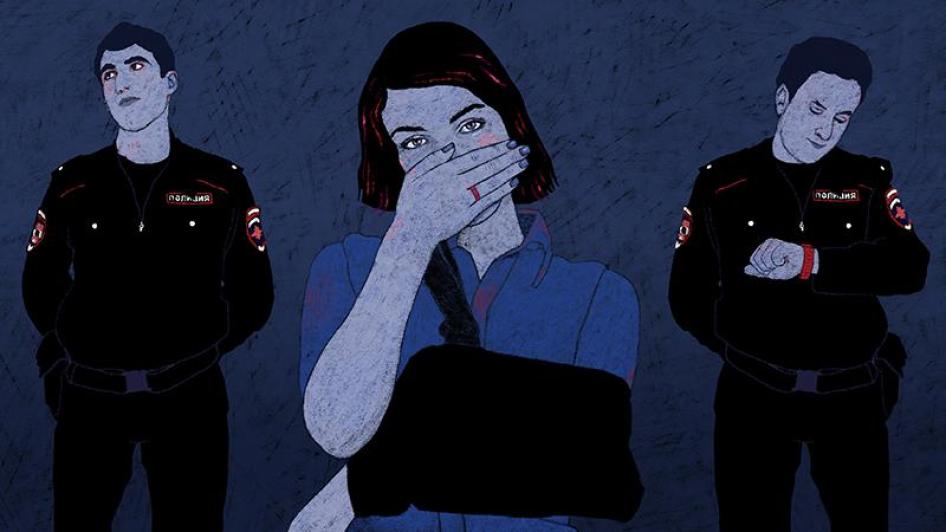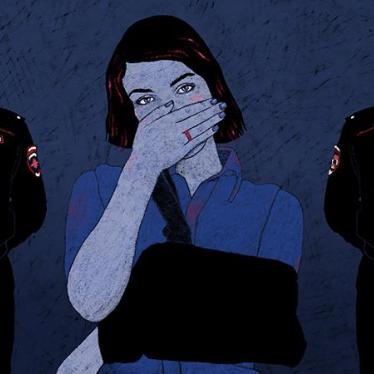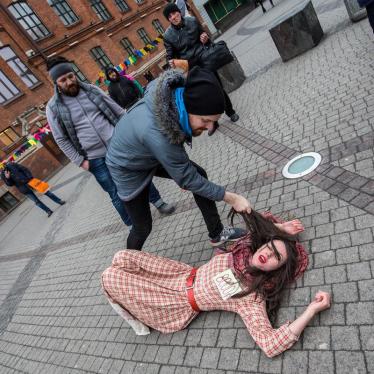In July, the European Court of Human Rights issued its first ruling on a domestic violence case in Russia. That is important enough in itself. But the court also recognized the Russian authorities’ overall “reluctance to acknowledge the seriousness and extent of the problem of domestic violence in Russia and its discriminatory effect on women.” In other words, the court concluded that domestic violence and the official inaction the applicant faced was not an isolated incident, but rather the result of a systemic, ongoing failure on part of the Russian authorities to properly address domestic violence.
The facts of the case, brought by the human rights group the Stiching Justice Initiative (SJI), read like a blood-curdling horror novel. After Valeria Volodina separated from her former partner (identified as “S,” in 2015), he made her life a living hell.
Between 2016 and 2018, on separate occasions, “S” abducted Volodina, punched her in the face and stomach while she was pregnant, put a tracking device in her bag, repeatedly made death threats and tried to strangle her. He made an attempt on her life by damaging the brakes on her car. Once, he dragged her out of a taxi and tried to force her into his car. He stole her purse with all her documents in it. He shared private photos of her on social media without her consent.
A chilling refrain runs through the judgment: “The police declined to institute criminal proceedings…” Seven times Volodina reported episodes of violence - and seven times the police refused to investigate. When Volodina, fearing for her life, requested state protection in March 2018, regional police told the criminal investigator that her request was “unfounded” because there was “no threat to her person or property.” No formal decision was issued on her request.
SJI’s Vanessa Kogan, who represented Volodina at the European Court, told me, “When working on this case, we seriously did not know whether she would live to see this judgment.”
The ruling cites the Human Rights Watch 2018 report on domestic violence in Russia entitled “I Could Kill You and No One Would Stop Me.” One of the women I interviewed told me that after her husband beat her up, a policeman listened to her account without writing anything down. Before leaving, the policeman shared a laugh with her husband and told her to “be nice” to him. After he left, her husband beat her again and said: “I could kill you and no one would stop me. Are you stupid to call the police? Don’t you understand?” Part of that quote became the title of the report.
Russia has no domestic violence law and does not treat domestic violence as a stand-alone criminal offense. In a dramatic step back in 2017, certain forms of domestic violence were actually decriminalised. The police more often than not treat victims of domestic violence with open hostility and refuse to register or investigate their complaints.
Russian law does not provide for protection orders, which could help keep women safe from experiencing recurrent violence by their partners. The number of shelters for domestic violence survivors in Russia falls far below international standards, and places in those available are few. Non-governmental groups do great work providing emergency shelter and pro bono legal assistance to domestic violence victims but they struggle to fill the gap.
There have been several high-profile domestic violence cases in Russia in recent years, including the ongoing case of Khachaturyan’s sisters, three young women who are awaiting trial for killing their abusive father. Case files leaked to the press - including interrogation protocols - paint a horrifying picture of years of sexual, physical, and psychological abuse of the girls by their father.
Domestic violence experts and lawyers contend that in the absence of an adequate government response, the girls’ only choice was to defend themselves or to die at their father’s hands. Other cases also show that domestic violence, if left unchecked and unaddressed, can lead to horrific, deadly outcomes.
Valeria Volodina has seen some justice in her case. The court ordered the Russian government to pay her 20,000 euros for damages she has suffered plus legal costs. In addition to the main judgment, four judges wrote separate opinions. Judge Pinto de Albuquerque, for instance, issued a rallying cry to the court to do more “to eradicate gender inequality and with it, the wholly demeaning occurrence of domestic violence.”
Russia’s government should also take this judgment as an imperative for urgent action to prevent and respond to domestic abuse. No woman should have to fear for her life from domestic abuse while the government turns a blind eye to the danger.











